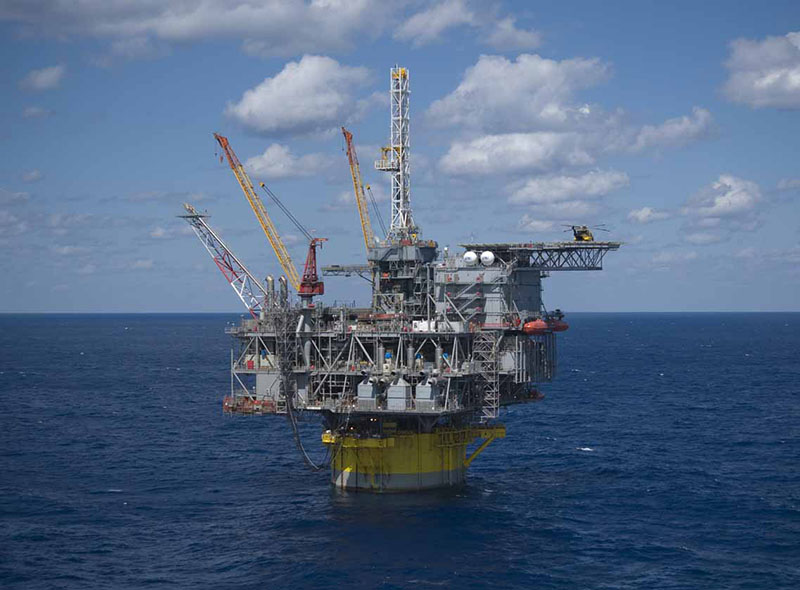(Bloomberg) -- Pemex expected oil majors to line up for a historic chance to help it tap the giant Perdido reserves in ultra-deep waters of the Gulf of Mexico. So far sign-ups for an auction have only trickled in.
Days before the Sept. 5 deadline to begin the bidding process to join Petroleos Mexicanos’s first oil production joint venture since ending more than seven decades of state monopoly, Chevron Corp, BP Plc and Total SA were the only big oil producers among the five companies that had enrolled as of Thursday, according to data on the oil regulator’s website. Exxon Mobil Corp. was added to the list Friday, while Royal Dutch Shell Plc and Anadarko Petroleum Corp., which have paid for access to the field’s seismic data, still aren’t among pre-qualified bidders.
Being the state oil company in a country where the industry is still mostly a government affair comes with many benefits, but that’s exactly what may be scaring investors away. The joint operating agreement, or JOA, drafted by the Mexican government may expose Pemex’s partners to excessive environmental risks in a challenging area of the Gulf, while Pemex retains a large role in the decision-making, analysts said. That might explain the tepid demand.
“The JOA is much more conflict-ridden than it is cooperation-prone,” John Padilla, Managing Director of energy consulting firm IPD Latin America, said in a phone interview. Companies have also expressed concerns with the minimum $464 million they’ll have to put in to cover their share in investments Pemex has already made, and that the agreement will be governed by Mexican law, which lacks clarity in regards to joint venture regulation, he said.
Extreme Depth
The winning bidders will partner with Pemex to develop the Trion field, located 40 kilometers (25 miles) from shore on the Mexican side of the Perdido belt that straddles the maritime border with the U.S. The field is estimated to contain as much as 485 million barrels of oil equivalent in waters as deep as 2,500 meters (8,200 feet), according to Pemex. As many as eight companies will enroll for the bidding, Juan Carlos Zepeda, National Hydrocarbons Commissioner, said in an e-mailed message.
Shell, which operates fields on the U.S. side of the area, describes its Perdido oil and gas production and drilling platform as the deepest in the world, coping with challenges such as extreme water depth, rugged sea-floor terrain and low-temperature, low-pressure reservoirs in a new geological frontier, according to its website.
Mexico estimates its side of the Perdido belt may contain as many as 10 billion barrels of potential crude reserves. Seventy-six percent of the country’s prospective resources are located in the deep waters of the Gulf, according the energy ministry.
Sovereign Immunity
The JOA for Trion can be modified until Sept. 30. It currently calls for at least two operating partners while Pemex, which controls almost all of the country’s oil production, distribution and refining industry, maintains as much as a 45 percent stake in the field. But when it comes to the risks, the agreement could put the burden mainly on operators as it would give Pemex the opportunity to invoke sovereign immunity, meaning it could be absolved of responsibility in the case of an oil spill or other incidents, according to George Baker, analyst and publisher of Mexico Energy Intelligence.
“If there were an incident, and if that incident came to U.S. courts, Pemex could walk away from it,” Baker said in a telephone interview from Houston.
The terms of the JOA proposed by Mexico expose Pemex’s operating partners to more risk than similar types of contracts usually do, according to Steven Otillar, a partner at Akin Gump Strauss Hauer & Feld LLP who has acted as an adviser to energy companies in Mexico.
‘Greater Exposure’
There’s "greater exposure for an operator, as opposed to non-operators, under this form of JOA than you might typically see in a deep-water development in another emerging market," he said.
Pemex, in an e-mailed response to questions, said “the idea that the terms of the JOA aren’t favorable is debatable because the text, aside from some local adjustments, is standard.”
Mexico is having better luck with a Dec. 5 auction of 10 deep-water oil blocks that will allow international producers to bid as groups to develop the fields from scratch, without having to partner with Pemex. A total of 26 companies have qualified to bid for those prospects, including Exxon, Shell and Chevron.
There “is clearly less interest in the Pemex farmout” than in the accompanying Dec. 5 bid round, Sergio Pimentel, a member of Mexico’s Nation Hydrocarbons Commission, said in an Aug. 29 webcast session.
Extended Deadline
The commission voted during that session to extend the period for companies to request to qualify to bid until Sept. 5. To date, a total of ten companies have registered to access Trion’s seismic data. The other two companies that signed up are Australian mining giant BHP Billiton Ltd. and Japan’s Inpex Corp., but being on the list of pre-qualified bidders doesn’t mean they’ll necessarily bid. The announcement of the results is slated for Dec. 5, the same day as the next auction.
Pemex, which has seen its oil output fall for 11 straight years, has lauded the joint venture in the Trion field as a remedy to reverse the company’s mounting financial woes. The company said as much as $11 billion in investment is required to develop Trion. Some producers may wait until Mexico’s overhaul of the oil industry’s regulations provides further assurance before they commit to a partnership like Trion.
"You might see parties that won’t participate in the early years of the reform until there is more case law and certainty” in the contractual details, Otillar said. “But that just means there will be opportunities for companies willing to take a more aggressive position.”
Bloomberg News by Adam Williams




